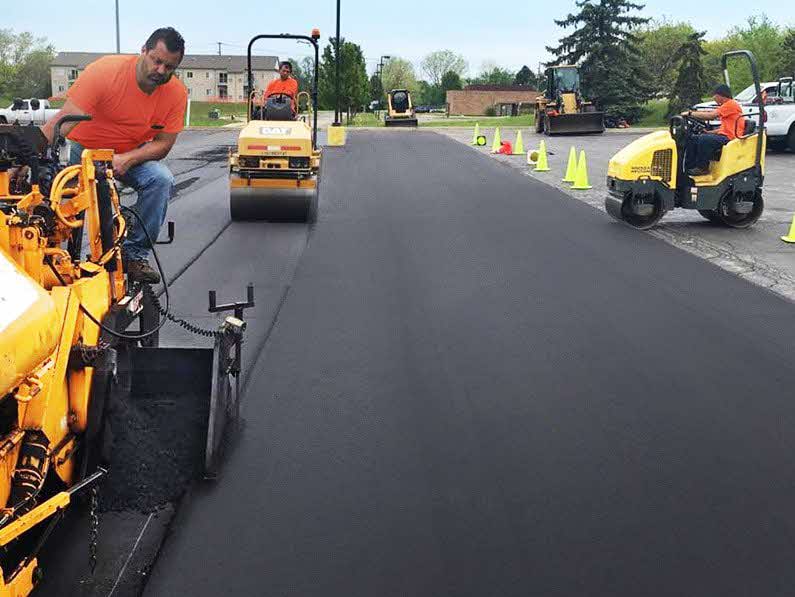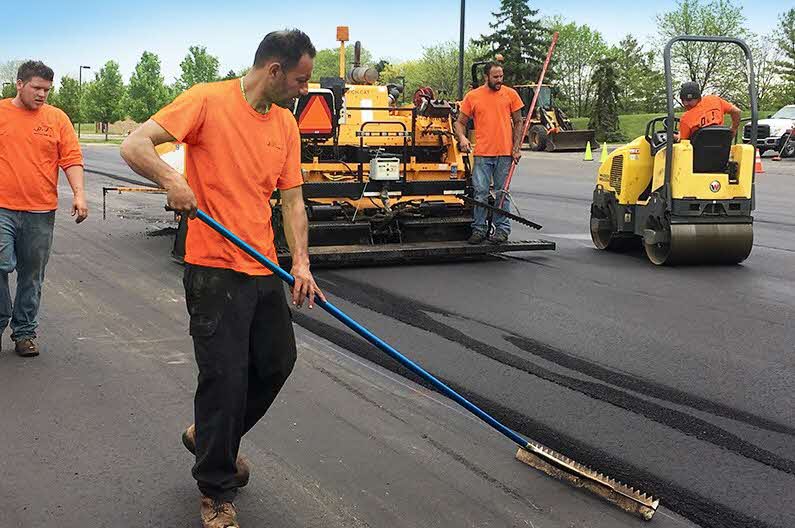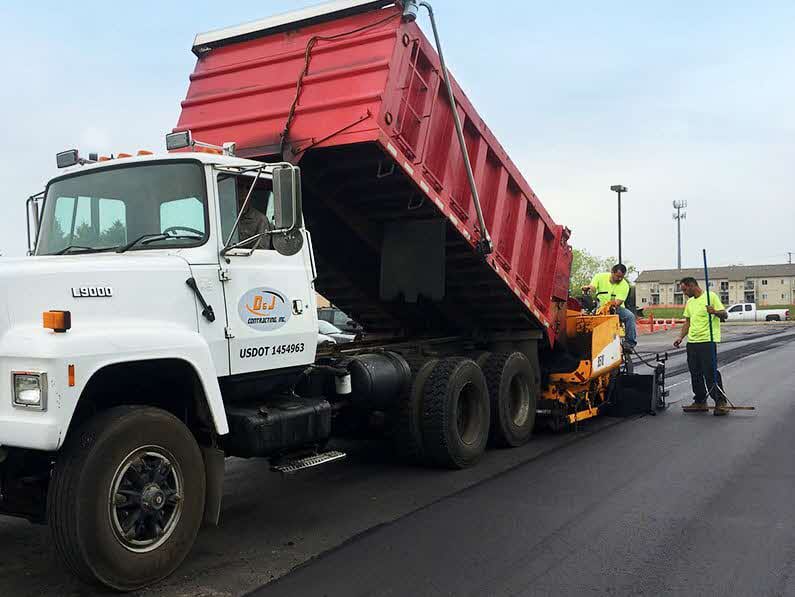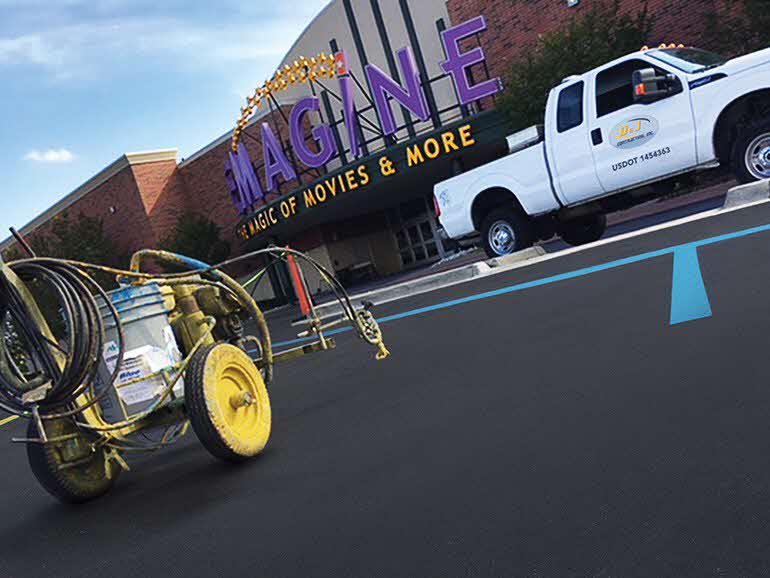Asphalt Installations Warren Michigan
We Are Locally Owned
& Operated For 36 Years
About Asphalt Installations
Introduction
Asphalt installations play a vital role in commercial properties due to their durability, aesthetics, and cost-effectiveness. Whether you’re resurfacing an old asphalt driveway, seeking asphalt maintenance, or planning a new asphalt driveway installation, understanding the benefits and process is key. This comprehensive guide provides insights on the nuances of asphalt installations, emphasizing their benefits and worldly application for commercial properties. Whether you’re a property owner planning for asphalt resurfacing or a contractor offering asphalt sealcoating services, this guide provides valuable knowledge and insights to enhance your understanding and decision-making processes.
The Process of Asphalt Installations
An efficient and durable asphalt installation involves a step-by-step process, executed by experienced professionals. Understanding these steps can ensure a smooth operation and optimize results. The process commences with the removal of the existing surface, followed by grading and sloping to ensure proper drainage. After this, a sub-base layer is applied for stability, then the asphalt mixture is poured and compacted for maximum strength. Finally, the surface is smoothed and sealed to protect it from environmental elements.
Benefits of Asphalt Driveway Installation
Asphalt driveway installation proves to be a cost-effective, durable, and aesthetically pleasing solution for commercial properties. It can substantially enhance a property’s curb appeal and add to its value. The durability of asphalt makes it resistant to the adverse effects of weather, while its robustness can stand up to the heavy traffic typically found in commercial settings. Moreover, its maintenance is hassle-free and can be easily managed through regular asphalt maintenance services.
Asphalt Resurfacing and Asphalt Maintenance: Keeping Your Installation in Top Shape
Asphalt resurfacing is a vital aspect of maintaining the longevity of your installation. Over time, exposure to weather, vehicle fluids, and heavy use can cause damage. Resurfacing involves the application of a new layer of asphalt, restoring the surface to its original beauty and integrity. This not only eliminates visual signs of wear and tear but also enhances the life of your commercial asphalt installation.
Regular asphalt maintenance is another imperative for extending lifespan and maintaining quality. This includes regular sweeping, annual inspections, immediate repairs of any potholes or cracks, and routine sealcoating. Engaging reputable professionals for your asphalt maintenance can ensure that these tasks are executed efficiently and expertly.
The Value of Asphalt Sealcoating Services
Sealcoating can enhance the longevity of your asphalt installation significantly. Particularly useful for commercial properties suffering from harsh weather or high vehicle usage, sealcoating services provide an additional protective layer. This can ward off potential damage, slow the process of oxidation, and improve overall aesthetic appeal by giving asphalt a sleek, deep-black finish.
Conclusion
Navigating the world of asphalt installations for commercial properties can seem daunting, but an understanding of the benefits, process, and maintenance can lead to informed, efficient decisions. Whether you’re considering asphalt driveway resurfacing, inquiring about routine asphalt maintenance, or contemplating a brand new asphalt driveway installation, quality professional services can ensure an investment that delivers longevity and value.
Weave your commercial dreamscapes with beautiful, durable, and cost-effective asphalt installations. Embrace the proven efficiency of asphalt resurfacing and value-driven asphalt maintenance services. Enjoy the reliable protection and enhanced aesthetics offered by asphalt sealcoating services. Make informed decisions and achieve optimum results for your commercial property with a deep understanding of these processes.
So, why wait? Reach out to the best professionals in your city or region and embark on the journey to long-lasting, beautiful asphalt installations today. Grow your business, augment your commercial success, and create aesthetically-pleasing spaces with the strength and beauty of asphalt.
Contact Us Today for a FREE
Asphalt Installation Quote






About Warren, Michigan
History
Beebe’s Corners, the original settlement in what would become the city of Warren, was founded in 1830 at the corner of Mound Road and Chicago Road; its first resident was Charles Groesbeck. Beebe’s Corners was a carriage stop between Detroit and Utica, and included a distillery, mill, tavern, and trading post. It was not until 1837 that the now-defunct Warren Township was organized around the settlement, first under the name Hickory, then renamed Aba in April 1838, and finally renamed Warren shortly thereafter. It was named for War of 1812 veteran, and frontier cleric, Rev. Abel Warren. However, when it was originally organized the township was named for Rev. Warren who was a Methodist Episcopal preacher who left his native New York in 1824 for Shelby Township. He went throughout the present-day Macomb, Lapeer, Oakland, and St. Clair Counties, baptizing, marrying, and burying pioneers of the area, as well as establishing congregations and preaching extensively. He was the first licensed preacher in the State of Michigan.
Another version of the source of the city’s name claims it was “named for General Joseph Warren, who fell at the Battle of Bunker Hill.”
The settlement was formally incorporated as the Village of Warren from Warren Township on April 28, 1893, out of one square mile bound by 14 Mile Road and 13 Mile Road to the north and south, and in half-a-mile east and west of Mound Road. The small village grew slowly, and had a population of 582 in 1940 and 727 in 1950, while the larger surrounding township grew at a much quicker pace. Much of this growth was due to the construction of the Chrysler’s Truck Assembly plant in 1938, the Detroit Arsenal Tank Plant in 1940 to support the WW II effort, and the General Motors Technical Center between 1949 and 1956.
The Red Run and Bear Creek, just small creeks back in the 1800s, has blossomed into an open major inter-county stormdrain flowing through Warren, into the Clinton River, and onwards to Lake St. Clair.
The Village of Warren and most of the surrounding Township of Warren, together with Van Dyke, incorporated as a city in 1957, less the city of Center Line, which had incorporated as a village from Warren Township in 1925 and as a city in 1936. Between 1950 and 1960, Warren’s population soared from 42,653 to 89,426. This population explosion was largely fueled by the post-WWII Baby Boom and later, by white flight from its southern neighbor of Detroit in that decade. This change in population continued into the next decade when the city’s population doubled again, ultimately reaching a high of 179,000 in 1970.
Warren was a sundown town: an all-white municipality that outlawed the presence of people of color after sunset. Those who violated this social order were subjected to violence. In 1970, Warren had a population of 180,000, with only 28 minority families, most of whom lived on a U.S. military base. As of 1974 African Americans were almost totally excluded from Warren, In 2000 Warren had less than 3% Black population, compared to 80% in adjacent Detroit.
Mayors
The following is a list of the previous mayors of the city. The current mayor is Lori Stone. Mayoral elections are currently non-partisan.
| Mayor | Start of Term | End of Term |
|---|---|---|
| Arthur Miller (D) | 1957 | 1961 |
| Louis Kelsey (D) | 1961 | 1961 |
| Bill Shaw (D) | 1961 | 1967 |
| Ted Bates (D) | 1967 | 1981 |
| James Randlett (D) | 1981 | 1985 |
| Ronald Bonkowski (D) | 1985 | 1995 |
| Mark Steenbergh (D) | 1995 | 2007 |
| James Fouts (D) 2007-2015 (I) 2015 | 2007 | 2023 |
| Lori Stone (D) | 2023 | Current |
Geography
Warren is a core city of Metro Detroit. According to the United States Census Bureau, the city has a total area of 34.46 square miles (89.25 km), of which 34.38 square miles (89.04 km2) is land and 0.08 square miles (0.21 km) is water. The city covers a 6-by-6-mile (9.7 by 9.7 km) square (from 8 Mile Road to 14 Mile Road, south to north) in the southwest corner of Macomb County (minus the city of Center Line, which is a small city totally enclosed within Warren). Warren shares its entire southern border with the northern border of the Detroit city limits. Other cities bordering Warren are Hazel Park and Madison Heights to the west, Sterling Heights to the north, and Fraser, Roseville, and Eastpointe to the east.
Climate
Warren features a humid continental climate (Köppen: Dfa). Summers are somewhat hot with temperatures exceeding 90 °F (32 °C) on average 8.6 days. Winters are cold, with temperatures not rising above freezing on 39.1 days annually, while dropping to or below 0 °F (−18 °C) on average 1.2 days a year.
Major highways
 I-696 (Walter P. Reuther Freeway) cuts east and west through the city.
I-696 (Walter P. Reuther Freeway) cuts east and west through the city. M-53 (Van Dyke Avenue), which is also known as the Earle Memorial Highway, runs north and south and (roughly) bisects the city.
M-53 (Van Dyke Avenue), which is also known as the Earle Memorial Highway, runs north and south and (roughly) bisects the city. M-97 (Groesbeck Highway) is located in southeast Warren. It comes north from Detroit, and is a fast and wide diagonal connector to northern Macomb County.
M-97 (Groesbeck Highway) is located in southeast Warren. It comes north from Detroit, and is a fast and wide diagonal connector to northern Macomb County. M-102 (8 Mile Road), also known as Base Line Road, is the city’s southern border and the Macomb-Wayne county line.
M-102 (8 Mile Road), also known as Base Line Road, is the city’s southern border and the Macomb-Wayne county line.
Unnumbered roads
Mound Road is an important north–south artery in the city. East-west travel is mainly on the mile roads. Most notable are 8 Mile Road, which is on the southern border of Warren with Detroit; 11 Mile Road, which serves as a service drive for I-696, and 14 Mile Road, which is on the northern border of Warren with Sterling Heights.
Demographics
| Census | Pop. | Note | %± |
|---|---|---|---|
| 1900 | 890 | — | |
| 1910 | 2,346 | 163.6% | |
| 1920 | 6,780 | 189.0% | |
| 1930 | 24,024 | 254.3% | |
| 1940 | 23,658 | −1.5% | |
| 1950 | 42,653 | 80.3% | |
| 1960 | 89,246 | 109.2% | |
| 1970 | 179,260 | 100.9% | |
| 1980 | 161,134 | −10.1% | |
| 1990 | 144,864 | −10.1% | |
| 2000 | 138,247 | −4.6% | |
| 2010 | 134,056 | −3.0% | |
| 2020 | 139,387 | 4.0% | |
| U.S. Decennial Census 2018 Estimate |
|||
The remaining figures are from the 2000 census except when otherwise stated. The top six reported ancestries (people were allowed to report up to two ancestries, thus the figures will generally add to more than 100%) in Warren in 2000 were Polish (21.0%), German (20.4%), Irish (11.5%), Italian (10.6%), English (7.3%), and French (5.3%).
There were 55,551 households, out of which 27.8% had children under the age of 18 living with them, 49.7% were married couples living together, 11.7% had a female householder with no husband present, and 33.9% were non-families. 28.8% of all households were made up of individuals, and 12.0% had someone living alone who was 65 years of age or older. The average household size was 2.47 and the average family size was 3.05.
The city’s age distribution was 22.9% under 18, 7.6% from 18 to 24, 30.8% from 25 to 44, 21.4% from 45 to 64, and 17.3% who were 65 or older. The median age was 38 years. For every 100 females, there were 95.6 males. For every 100 females age 18 and over, there were 92.1 males.
The median income for a household in the city was $44,626, and the median income for a family was $52,444. Males had a median income of $41,454 versus $28,368 for females. The per capita income for the city was $21,407. 7.4% of the population and 5.2% of families were below the poverty line. Out of the total people living in poverty, 9.5% were under the age of 18 and 5.8% were 65 or older.
There are a number of distinguishing characteristics about Warren which render it unique among American cities of its relative size. Warren was one of the fastest-growing municipalities in the country between 1940 and 1970, roughly doubling its population every 10 years. In 1940 the official population of Warren Township was 22,146; in 1950, it was 42,653; in 1960, after Warren Township had become the City of Warren, population had risen to 89,240; and by 1970 it had grown to 179,260.
Since 1970, Warren has been consistently one of the faster-declining cities in population in the country. The population declined by 10% during each of the next two decades (1980: 161,060; 1990: 144,864), and dropped by 4.6% between 1990 and 2000.
In 1970, whites made up 99.5% of the city’s total population of 179,270; only 838 non-whites lived within the city limits. In the ensuing two decades the white portion of the city dropped gradually to 98.2% in 1980 and 97.3% as of 1990. The white population declined to 91.3% in 2000 and reached 78.4% as of the 2010 census.
For 2000, the non-Hispanic white population of Warren was 90.4% of the total population. African-American were 2.7% of the population (which is the same as the total non-white population in 1990), Asians were 3.1% of the population, Native Americans 0.4%, other groups 0.3% and those reporting two or more races were 2.2% of the population. Hispanics or Latinos or any race were 1.4% of the population.
Warren’s population was as of 2000 one of the oldest among large cities in the United States. 16.1% of Warren’s population was 65 or older at the last census, tied for fifth with Hollywood, Florida among cities with 100,000+ population, and in fact the highest-ranking city by this measure outside of Florida or Hawaii. Warren is ranked 1st in the nation for longevity of residence. Residents of Warren on average have lived in that community 35.5 years, compared to the national average of eight years for communities of 100,000+ population. Warren remains a population center for people of Polish, Lebanese, Ukrainian, Albanian, Scots-Irish, Filipino, Maltese and Assyrian/Chaldean descent.
In 2000 there were 1,026 Filipinos in Warren as well as 1,145 Asian Indians in the city, and 1,559 American Indians. Many of the American Indians in Warren originated in the Southern United States with 429 Cherokee and 66 Lumbee. The Lumbee were the third largest American Indian “tribe” in the city, with only the 193 Chippewa outnumbering them.
2020 census
| Race / Ethnicity (NH = Non-Hispanic) | Pop 2000 | Pop 2010 | Pop 2020 | % 2000 | % 2010 | % 2020 |
|---|---|---|---|---|---|---|
| White alone (NH) | 124,936 | 103,308 | 85,868 | 90.37% | 77.06% | 61.60% |
| Black or African American alone (NH) | 3,676 | 17,978 | 28,179 | 2.66% | 13.41% | 20.22% |
| Native American or Alaska Native alone (NH) | 466 | 524 | 344 | 0.34% | 0.39% | 0.25% |
| Asian alone (NH) | 4,240 | 6,170 | 14,303 | 3.07% | 4.60% | 10.26% |
| Pacific Islander alone (NH) | 28 | 18 | 26 | 0.02% | 0.01% | 0.02% |
| Other race alone (NH) | 168 | 140 | 629 | 0.12% | 0.10% | 0.45% |
| Mixed race or Multiracial (NH) | 2,865 | 3,160 | 6,475 | 2.07% | 2.36% | 4.65% |
| Hispanic or Latino (any race) | 1,868 | 2,758 | 3,563 | 1.35% | 2.06% | 2.56% |
| Total | 138,247 | 134,056 | 139,387 | 100.00% | 100.00% | 100.00% |
2010 census
As of the census of 2010, there were 134,056 people, 53,442 households, and 34,185 families residing in the city. The population density was 3,899.2 inhabitants per square mile (1,505.5/km2). There were 57,938 housing units at an average density of 1,685.2 per square mile (650.7/km). The racial makeup of the city was 78.4% White, 13.5% African American, 0.4% Native American, 4.6% Asian, 0.4% from other races, and 2.6% from two or more races. Hispanic or Latino of any race were 2.1% of the population.
There were 53,442 households, of which 30.6% had children under the age of 18 living with them, 42.2% were married couples living together, 15.9% had a female householder with no husband present, 5.9% had a male householder with no wife present, and 36.0% were non-families. 30.4% of all households were made up of individuals, and 12.6% had someone living alone who was 65 years of age or older. The average household size was 2.49 and the average family size was 3.11.
The median age in the city was 39.4 years. 22.7% of residents were under the age of 18; 9% were between the ages of 18 and 24; 26.1% were from 25 to 44; 26.1% were from 45 to 64; and 16.1% were 65 years of age or older. The gender makeup of the city was 48.4% male and 51.6% female.
Between 2000 and 2010, the Asian population in Warren increased to almost 6,200, a 46% increase. This was a much slower growth rate than that of the African-American population that grew from 3,700 to over 18,000 or a more than 300% increase.
Mid-2010s estimates
The 2014 census estimate placed Warren’s population at 134,398, of which the non-Hispanic white population was estimated to be 74.4%. The corresponding 2014 percentages for African-Americans and Asian-Americans was 15% and 6%, respectively. Latinos, Native Americans, Pacific islanders, those reporting two or more races and those reporting some other race were not noticeably changed from the 2010 percentages.
The 2015 census estimate placed Warren’s population at 135,358.
Education
Public schools
Warren is served by six public school districts, including:
- Center Line Public Schools
- Eastpointe Community Schools
- Fitzgerald Public Schools
- Van Dyke Public Schools
- Warren Consolidated Schools
- Warren Woods Public Schools
The Macomb Intermediate School District oversees the individual school districts.
Secondary schools serving Warren include:
- Warren Woods Tower High School
- Paul K. Cousino Sr. High School
- Lincoln High School
- Warren Mott High School
- Fitzgerald High School
- Center Line High School (Center Line)
- Eastpointe High School (Eastpointe)
Charter schools:
- Michigan Collegiate
Private schools
- Crown of Life Lutheran School
- De La Salle Collegiate High School (all-boys)
- Regina High School (all-girls)
- Mary Help of Christians Academy (1986–99)
Postsecondary institutions
- Macomb Community College (South Campus)
- Davenport University
- Wayne State University’s Advanced Technology Education Center.
Public libraries
Warren Public Library consists of one main library and three branches. The Civic Center Library is located on the ground floor of the city hall. The Arthur Miller Branch is inside the Warren Community Center. The other two branches are the Maybelle Burnette Branch and the Dorothy Busch Branch.
On July 1, 2010, the three branch libraries were closed. On August 3, the Library Millage was approved; as such, these branch libraries reopened later that August.
Contact Us Today for a FREE
Asphalt Installation Quote
Our Asphalt Installation services are available in Warren as well as all of Macomb County.
Our dedicated team at D&J Contracting Inc is at-the-ready to provide you with great customer service and first class Asphalt Installation services. Reach out to us at (586) 954-0008 to discuss your Asphalt Installation needs today!